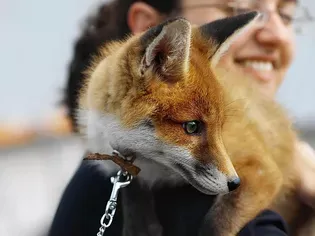Should You Keep a Russian Red Fox as a Pet?
Updated on 04/26/24

Title: Should You Keep a Russian Red Fox as a Pet?
Introduction:
Russian red foxes are captivating creatures with their fiery coats, piercing gazes, and enigmatic nature. Their allure has prompted many to consider keeping them as pets. However, before making this decision, it's crucial to delve into the complexities and responsibilities involved in caring for these wild animals. In this comprehensive post, we'll explore the pros and cons of owning a Russian red fox as a pet, shedding light on their unique needs, behaviors, and the legal and ethical implications.
Understanding the Nature of Russian Red Foxes:
Russian red foxes are solitary creatures that thrive in vast, open spaces where they can roam and hunt freely. They are highly territorial and form monogamous pairs during the breeding season. Domestication has not significantly altered their instincts, and they remain wild animals with specific behavioral and environmental requirements.
Pros of Owning a Russian Red Fox as a Pet:
1. Unforgettable Companionship:
Russian red foxes can develop strong bonds with their owners through regular socialization and training. Their intelligence, playful nature, and affectionate demeanor can provide years of companionship and entertainment.
2. Physical and Mental Stimulation:
Caring for a Russian red fox requires significant effort and attention. They need ample indoor and outdoor space to exercise and explore, as well as interactive toys and puzzles to stimulate their minds. This level of care can be highly rewarding for owners who enjoy the challenges of providing a thriving environment for their pets.
3. Unique Aesthetic Appeal:
Russian red foxes are undeniably beautiful animals with their vibrant coats and sleek features. Their presence in a home can add a touch of exotic charm and become a focal point of conversations.
Cons of Owning a Russian Red Fox as a Pet:
1. Complex Needs and Veterinary Care:
Russian red foxes have specialized dietary, medical, and environmental needs that can be challenging to meet in a domestic setting. They require a specific diet, regular veterinary check-ups, and access to a safe and spacious enclosure. Their unique health concerns often necessitate specialized veterinary care.
2. Territorial and Predatory Instincts:
Russian red foxes can be territorial and possessive, especially towards other animals. They have strong predatory instincts and may perceive small pets or children as potential prey. Proper socialization and training are essential to mitigate these risks.
3. Legal and Ethical Concerns:
In many jurisdictions, it's illegal to keep Russian red foxes as pets due to concerns about their status as wild animals. Even in areas where it's permitted, ethical considerations arise regarding the suitability of keeping such animals confined and away from their natural habitats.
Examples of Behavioral Issues:
Aggressive Behavior: Russian red foxes can become defensive or aggressive if they feel threatened or provoked. They may bite, scratch, or growl to protect themselves.
Escape Artistry: Russian red foxes are skilled escape artists and may find ways to breach enclosures or fences, putting themselves and others at risk.
Vocalization: Russian red foxes are vocal animals and may exhibit loud barking, howling, or whining, especially at night or when left alone for extended periods.
Considerations for Legal and Ethical Concerns:
Legal Implications:
* Check local and state laws to determine if keeping a Russian red fox as a pet is permitted.
* Obtain proper permits and licenses if required.
* Be aware of potential penalties and fines for illegal possession.
Ethical Concerns:
* Question the morality of keeping wild animals in captivity for entertainment purposes.
* Consider the impact of separation from their natural habitat and social structure.
* Support responsible breeding practices to ensure the well-being of captive foxes.
Alternatives to Pet Ownership:
* Volunteer at wildlife sanctuaries or rehabilitation centers.
* Observe Russian red foxes in their natural habitats through wildlife tours.
* Support conservation efforts to protect their populations.
Conclusion:
The decision of whether or not to keep a Russian red fox as a pet is a complex one that requires careful consideration of both the pros and cons. Their unique needs, behavioral challenges, and legal and ethical implications must be thoroughly understood before making a commitment. If you're truly dedicated to providing a responsible and fulfilling life for a Russian red fox, be prepared for a substantial investment of time, resources, and emotional support. Otherwise, consider alternative ways to appreciate these magnificent creatures from a respectful distance.
Explore More Pets

Exotic Pet Species
Should You Keep a Chimpanzee as a Pet?

Exotic Pet Species
Should You Keep a Raccoon as a Pet?

Exotic Pet Species
How to Care for a Pet Mexican Red-Knee Tarantula

Exotic Pet Species
12 Best Exotic Pets for Apartment Living

Exotic Pet Species
Best Foxes to Keep as Pets

Exotic Pet Species
Should You Keep a Northern Flying Squirrel as a Pet?

Exotic Pet Species
Should You Keep Stick Insect as a Pet?

Exotic Pet Species
Should You Keep a Big Cat as a Pet?